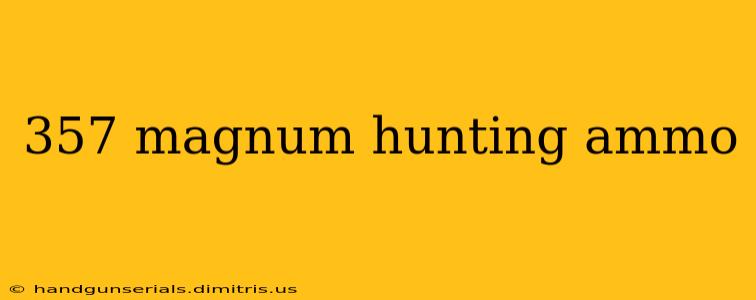The .357 Magnum cartridge, renowned for its stopping power and versatility, occupies a unique space in the hunting world. While not the first choice for large game, its effectiveness in certain situations, coupled with its widespread availability and manageable recoil, makes it a compelling option for specific hunting scenarios. This guide delves into the nuances of using .357 Magnum ammunition for hunting, exploring its capabilities, limitations, and optimal applications.
Understanding the .357 Magnum's Hunting Capabilities
The .357 Magnum, born from the legendary Smith & Wesson .38 Special, packs a significant punch for its size. Its high velocity and substantial bullet weight translate to impressive energy transfer, making it lethal against smaller game and effective for self-defense in hunting situations. However, it's crucial to understand its limitations before embarking on any hunting trip.
Advantages of .357 Magnum for Hunting:
- Stopping Power: The .357 Magnum delivers exceptional stopping power, particularly with heavier, jacketed hollow-point bullets. This is crucial for quick, ethical kills, minimizing animal suffering.
- Versatility: Its suitability for both handgun and carbine platforms adds versatility. This allows hunters to choose the weapon best suited to the terrain and hunting style.
- Penetration: While not as deeply penetrating as larger calibers, the .357 Magnum offers sufficient penetration for many small to medium-sized game animals.
- Availability: .357 Magnum ammunition is readily available, making it easier to find than some more specialized hunting rounds.
- Manageable Recoil: Compared to heavier magnum cartridges, the .357 Magnum has manageable recoil, even for novice hunters.
Limitations of .357 Magnum for Hunting:
- Limited Range: The .357 Magnum's relatively shorter effective range compared to other hunting calibers restricts its use to closer shots. Accurate shots beyond 100 yards become increasingly challenging.
- Energy Drop-off: Energy transfer decreases significantly with distance, impacting its effectiveness at longer ranges.
- Not Suitable for Large Game: The .357 Magnum is unsuitable for larger game animals due to insufficient stopping power and penetration to ensure a quick and humane kill. Using it on larger animals is unethical and potentially dangerous.
Choosing the Right .357 Magnum Ammo for Hunting
Selecting the appropriate ammunition is critical for successful and ethical hunting. The choice hinges on the target game and hunting conditions.
Bullet Types:
- Jacketed Hollow Points (JHP): JHP ammunition offers excellent expansion and stopping power, minimizing bullet over-penetration. This is generally the preferred choice for hunting.
- Jacketed Soft Points (JSP): JSP rounds provide a balance between expansion and penetration, making them suitable for hunting medium-sized game.
- Full Metal Jacket (FMJ): While less effective for hunting due to limited expansion, FMJ rounds are suitable for practice or target shooting.
Grain Weight:
Heavier grain weights generally provide greater penetration and energy transfer at the cost of slightly reduced velocity. Lighter grain weights offer higher velocity but may result in less penetration. The optimal grain weight depends on the target game.
Ethical Considerations
Ethical hunting practices are paramount. Using the .357 Magnum responsibly means understanding its limitations and ensuring a clean, humane kill. Avoid taking shots at long ranges or at animals that are beyond your effective shooting distance. Always ensure a quick, ethical kill.
Conclusion
The .357 Magnum, while not a universal hunting cartridge, serves as a versatile and effective option for specific hunting scenarios. Understanding its capabilities and limitations, selecting the appropriate ammunition, and prioritizing ethical hunting practices are essential for responsible use. Always comply with local hunting regulations and prioritize safety.

